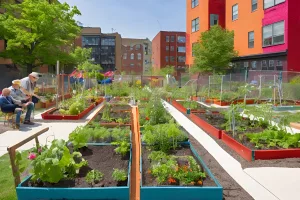In October 2024, South Africa’s elderly will see a small boost in their SASSA oldage grants, increasing by R10 to R2,190 for those aged 6074 and R2,210 for those 75 and older. While every little bit helps, this increase doesn’t fully ease the burden of rising costs for essentials like food and healthcare. With around four million elderly recipients relying on these grants, it raises important questions about whether the support is enough. Despite the challenges, there’s hope for change as communities and advocates push for better assistance for those in need.
Step Brothers Restaurant and Bar has moved to the lively Green Point in Cape Town, bringing its beloved Italian flavors with it. The restaurant offers a cozy atmosphere, outdoor seating, and even tennis courts for fun and relaxation. With a halalfriendly menu, it welcomes everyone to enjoy delicious dishes like spicy rock shrimp and perfectly baked pizzas. This new chapter is all about community and quality, making Step Brothers a mustvisit spot for great food and good times!
In a groundbreaking ruling, the Free State High Court in South Africa has declared that men can now take their spouse’s surname without facing any barriers, a change that highlights the importance of gender equality. Previously, only women had this right, marking a clear discrimination against men. This decision paves the way for both partners in a marriage to choose their identity freely, moving away from outdated traditions. The court’s ruling not only recognizes personal autonomy but also sets a powerful example for future laws, urging society to embrace true equality for everyone.
In 2022, the Western Cape had the lowest HIV rate in South Africa at 7.4%, with about 540,000 people living with HIV. The region has made great strides in treatment, with 76.8% of those affected receiving antiretroviral therapy. However, challenges remain, especially with rising infection rates among young people and men. While many adults are aware of their HIV status, a significant number still lack proper treatment. Efforts must continue to educate and support these vulnerable groups to create a healthier future for everyone.
In Mdantsane, a quiet community was shaken by a heartbreaking tragedy when two infants and a fouryearold child died after eating Top Score Instant Maize Porridge. The sadness spread quickly, touching many hearts as families mourned the young lives lost. In response, the company Namib Mills and Spar quickly recalled the porridge, showing their commitment to safety. This sad event reminds us all of the importance of making sure the food we eat is safe and the need for companies to act responsibly.
Drake Hogestyn, best known for playing John Black on ‘Days of Our Lives,’ has passed away at the age of 70 after a brave fight with cancer. His performances touched hearts for decades, making him a beloved figure in daytime television. Drake’s journey from aspiring baseball player to soap opera star shows his incredible resilience and talent. His kindness and dedication were felt not just on screen but also by his friends and family, leaving a lasting legacy of love and inspiration. Fans and colleagues will forever remember him as a true gem of the television world.
In South Africa, road accidents are a major danger for kids, with many suffering serious head injuries every year. A startling 96% of children hurt in these accidents were not wearing seatbelts, highlighting the need for better car safety. The “Be Quick to Click” campaign is working hard to change this by promoting the use of car seats and encouraging communities to donate and refurbish unused ones. This initiative is not just about safety; it’s a call for everyone to come together and protect our children on the roads. Let’s make sure every child has a safe journey!
The City’s Strategic Water Maintenance Plan is set to take place from September 30 to October 4, 2024, focusing on making sure our water supply is safe and reliable. During this time, various repairs and upgrades will happen across the city, including zeropressure tests that might cause some changes in water pressure for residents. Special care will be taken to clean and maintain the Glen Garry Reservoir, ensuring the water stays clean and safe for everyone. As these tasks unfold, it’s important for residents to prepare by storing water and being aware of possible temporary disruptions. This plan is all about protecting our city’s lifeblood: clean water for all!
Protecting Our Power: The Vital Role of Streetlight Maintenance in Claremont and Beyond
Streetlight maintenance in Claremont is essential for keeping our neighborhoods safe and welcoming. These bright lights not only guide our paths but also help prevent crime and build trust within the community. The City’s hardworking Energy teams tackle thousands of issues every month, ensuring that the streets stay welllit and inviting. By working together with residents, they create a safer environment for everyone, making Claremont a vibrant place to live. The simple act of fixing streetlights shines a light on the importance of community and collaboration in urban safety.
South Africa’s education system is facing tough times due to budget cuts, meaning fewer teachers and larger classes. By 2027, many areas will struggle financially, affecting students’ learning and future opportunities. Minister Gwarube warns this could lead to a crisis, where kids won’t get the attention they need to succeed. To turn things around, South Africa must rethink how it invests in education, seeing it as vital for the country’s future. With community help and smart use of technology, there’s hope to improve the situation for the youth.
Home Affairs in South Africa is now open on Saturdays from 8 AM to 1 PM until October 12, 2024, to help students get their IDs for the important National Senior Certificate exams starting on October 21. This means students can get the documents they need without rushing at the last minute. The government is also using technology to make ID applications easier and faster, helping to clear a backlog of requests. This new schedule shows a strong commitment to supporting students and modernizing public services for everyone.
The Green Point Marine Outfall incident in Cape Town showed how fragile urban infrastructure can be. On September 25, 2024, several pumps failed during maintenance, leading to a sewage discharge into the ocean. This situation taught the city important lessons: infrastructure needs to be strong, quick responses matter, clear communication builds trust, and urban systems should work in harmony with nature. Moving forward, Cape Town is taking steps to improve its water management, aiming for a better balance between city needs and environmental care.
Cissie Gool House is a shining symbol of hope in Cape Town’s fight for affordable housing. In 2017, brave activists transformed an old, neglected hospital into a home for 900 people, creating a vibrant community that stands against unfair housing practices. Their struggle has sparked important conversations with city leaders, who are now exploring ways to build more homes while ensuring current residents are not pushed out. This story shows the power of people coming together, fighting for their rights, and dreaming of a better future where everyone can have a place to call home.
Dame Maggie Smith, the beloved actress who brought magic to both stage and screen, has passed away at the age of 89, leaving a huge emptiness in the world of entertainment. Known for her unforgettable roles as Professor McGonagall and the sharpwitted Dowager Countess in *Downton Abbey*, she captivated hearts with her incredible talent and quick humor. Over her remarkable 60year career, she inspired many actors and created characters that will live on forever. As we say goodbye to this legendary figure, we remember the joy and brilliance she shared with audiences everywhere.
John Hlophe is a controversial figure in South Africa, known for his troubled history as a judge. He tried to sway decisions in favor of former President Jacob Zuma during corruption cases, raising serious questions about fairness in the justice system. Recently, a court barred him from participating in the Judicial Service Commission, which oversees judges, highlighting concerns about his influence on the judiciary. As South Africa navigates its democratic journey, Hlophe’s story serves as a reminder of the importance of integrity and accountability in law. The unfolding drama around him emphasizes that trust in the justice system is crucial for the nation’s future.
Sweetbeet’s summer menu is a colorful feast for the senses, bursting with exciting global flavors and fresh ingredients. Dive into dishes like the Corn Fritter & Cajun Chicken Bowl, where crunchy corn fritters meet spicy chicken, or enjoy the Grilled Chicken Flatbread, a tasty and healthy choice. Other highlights include the Vietnamese Crispy Chicken Rice Bowl, vibrant salads, and the refreshing Rooibos Iced Drinks. With something delicious for everyone, Sweetbeet invites you to savor every bite and sip this summer!
















